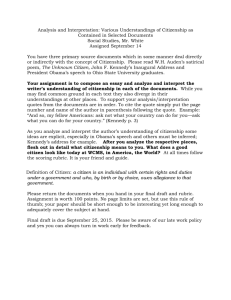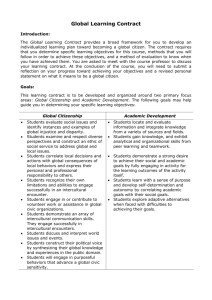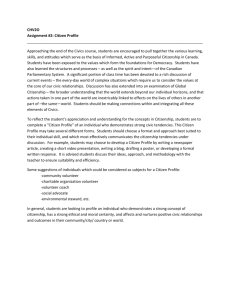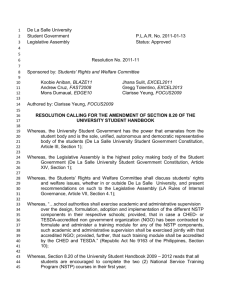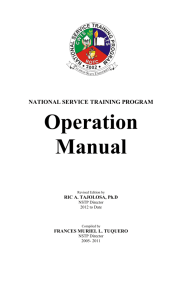By now, you must have realized that the heart of NSTP
advertisement
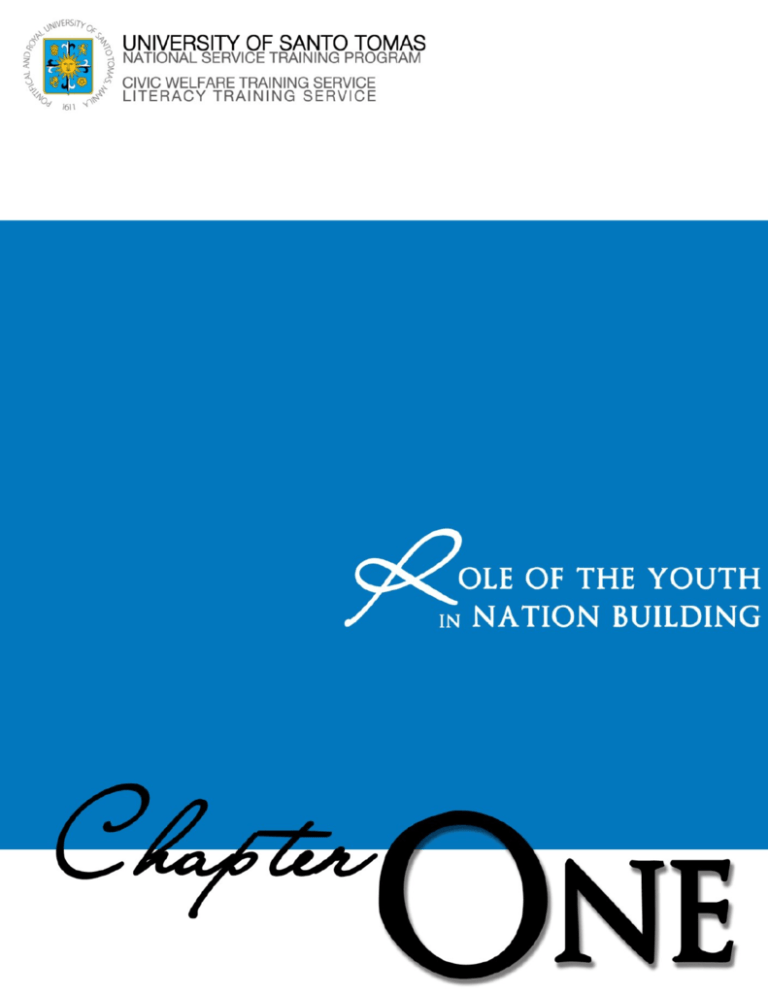
CHAPTER 1: ROLE OF THE YOUTH IN NATION-BUILDING Viva Tomasino!!! Welcome to the University of Santo Tomas National Service Training Program (NSTP) Civic Welfare Training Service (CWTS) and Literacy Training Service (LTS) courses! I sincerely hope that as you accomplish your chosen course and the modules, you will be able to share your ideas, experiences and help build a community of socially responsible students. There is a lot in store for you this semester, and to kick things up, read through the following lessons so you will find out why indeed, are you taking up this course. Let’s now go to Lesson 1. LESSON 1: GOOD CITIZENSHIP VALUES At the end of this lesson, you are expected to: 1. sustain and promote different Filipino Values that help in nation building 2. practice good citizenship values at all times, in all places If you are ready, let us learn and understand the true meaning of the values that has shaped us and our nation to what we are now. What is a good Filipino Citizen? A good Filipino citizen is one who plays an active and intelligent role as a member of the community. He is one who fulfills his duties and obligations to the government and society. He possesses the traits of respectfulness, courtesy and consideration for parents and elders and for others. He observes punctuality, promptness, and good moral conduct. How can you become a Good Citizen? You can become a good citizen by living in accordance with the good citizenship values derived from the Preamble of the 1987 Constitution: “We the sovereign Filipino people, imploring the aid of Almighty God in order to build a just humane society and establish a Government that shall embody our ideals and aspirations, promote the common good, conserve and develop our patrimony, and secure to ourselves and our posterity, the blessings of independence and democracy under the rule of law and a regime of truth, justice, freedom, love, equality, and peace, do ordain and promulgate this constitution.” CHAPTER 1: ROLE OF THE YOUTH IN NATION BUILDING Page 2 of 20 The Filipino values presented in the Preamble have been simplified and categorized into the following: I. Pagkamaka-Diyos A. Faith in the Almighty God (imploring the aid of Almighty God) B. Respect for Life C. Order D. Work E. Concern for the Family and Future Generations II. Pagkamaka-Tao A. Love B. Freedom (independence and democracy) C. Peace D. Truth E. Justice III. Pagkamaka-Bayan A. Unity B. Equality C. Respect for Law and Government (rule of law) D. Patriotism (conserve and develop our patrimony) E. Common Good IV. Pagkamaka-Kalikasan. Concern for the Environment These values help shape and guide our Nation towards a better tomorrow. We have seen these at work during the 1st People Power back in 1986. Through faith, prayer, respect and unity, we achieved freedom from dictatorship. Let us now explore the values that are inherently given to us and face the challenge of living a life in accordance with it. I. PAGKAMAKA-DIYOS A. The Good Citizenship Value of Faith in the Almighty God “Isa akong Katoliko at buong pusong tinatanggap ang kamatayan para sa Panginoon, kung ako man ay may sanlibong buhay, lahat ng iyon ay iaalay ko sa Kanya.” -San Lorenzo Ruiz CHAPTER 1: ROLE OF THE YOUTH IN NATION BUILDING Page 3 of 20 This is the basic value of the good Filipino citizen. As a Christian, you are asked to put God in the center of your lives and communicate with Him by means of prayers. You should look at Him as your ultimate source, one with infinite powers, to help you in your work, to enable you to meet your needs and to get you out of trouble and crisis. With this experience, you become fully aware of the things you can accomplish when you live a life of faith. It is ironic, however, that in a country where citizens are innately “maka-diyos”, many acts violating the laws of God are committed each day. How then can it be that you ask for God’s help and guidance then go against His wishes? Let us read this story by Bro. Andrew Maria, MMHC Faith Alone A devout widow who was known to be a living saint was crossing a bridge with her child when an accident happened. Her son fell off the bridge and plunged into the deep water below. At this, some men got ready to jump into the water to save the child. However, the widow forbade them. “Do not move,” she told the men, “my faith alone can save the child.” After she had said this, the widow knelt on the bridge and prayed with great faith. In a short while, the child drowned and died. The widow wept. This story teaches us that Faith alone, without work, is useless. You have to remember that as Thomasians and future leaders of this country, you have to put your faith into action, live a life that that is based on good values; and serve as an inspiration to others who struggle with their own faith in Almighty God. B. The Good Citizenship Value of Respect for Life Your life and humanity is a gift from God. You are created from His image and likeness. This makes you a person of worth and dignity. In turn, you should uphold and recognize others’ dignity as persons and grow to appreciate their worth by keeping an open mind and charitable attitude so you may be able to appreciate others’ giftedness and special roles. Your body is God’s temple, it is sacred and by all means, you should be responsible for it because any form of violence against it defies the sanctity of life. Natural human rights protect you from anything that endangers your life and well being. You should also be responsible for upholding the rights of others. You shall not be an advocate of violence or any means that may harm the life and dignity of others. CHAPTER 1: ROLE OF THE YOUTH IN NATION BUILDING Page 4 of 20 Life is precious. It is your duty to respect, protect, nurture and preserve the human life from the moment of its conception. Thoughts to ponder on: As a student, do I have habits and vices that may destroy my body? Do I treat other people with respect and dignity? C. The Good Citizenship Value of Order The value of Order is doing “first things first.” It is simply doing the right thing at the right time and the right place without hesitation. Order entails the discipline of mind, emotion and action. We need these so that we can live a peaceful, successful and productive life. Otherwise, it will trigger situations of panic, unrest, confusion, havoc and anarchy. You should understand that the value of Order is important in your quest to improve yourselves as citizens. You should learn to strive hard in arranging your lives in a certain way that will allow you to be more productive. Thoughts to ponder on: What are the benefits of living an orderly life? What are my priorities in life? D. The Good Citizenship Value of Work “Give fish to a man and he will have food for a day, teach him how to fish and he shall have food to eat throughout his lifetime” -Confucius Work is a gift and it has become part of your nature and destiny. God has given you talents to use as investments in your work and in return you are expected to settle for nothing less than excellent results. CHAPTER 1: ROLE OF THE YOUTH IN NATION BUILDING Page 5 of 20 Hard work, quality work and honest work are what makes a citizen a good, productive and self-reliant member of the society. It is also important that you have the right values and attitude towards your work and dealings. You should always remember that no matter how much work you do, what counts in the end is not the volume of work but the amount of love you put into your work. Learn to work with love, integrity, and honesty to achieve excellent results. Thoughts to ponder on: Am I a committed student who gives my best in school and in other endeavors? Do I use my God-given talents wisely? E. The Good Citizenship Value of Concern for the Family and Future Generations Respetuhin natin ang ating ina, ilaw siya ng tahanan Bigyang galang ang ama, at ang payo ang susudan At sa magkakapatid, kailangan ay magmahalan Dapat lang ay pag usapan ang hindi nauuwaan -- Francis Magalona “Mga Kababayan ko” This value emphasizes that your family is a gift from God and that utmost attention must be focused on the family as sanctuary of life and a core unit of society. You draw inspiration and strength from your Family and in return you are expected to do your responsibilities as a member of the family to keep it intact and strong against the forces that tend to destroy its values and sense of unity. A family is worth more than any worldly gain. Be vigilant and possess the resolve to always value your family as your most precious gift next to your life. Be strengthened by love, understanding and mutual respect for all members of your family. Thoughts to ponder on: o What pressing issues does my family face today? o Can I promise to value my family despite these issues? CHAPTER 1: ROLE OF THE YOUTH IN NATION BUILDING Page 6 of 20 II. PAGKAMAKA-TAO A. The Good Citizenship Value of LOVE "Ang tenga kapag pinagdikit korteng puso...Extension ng puso ang tenga, kaya kapag marunong kang makinig, marunong kang magmahal.." -- Bob Ong Love means so much to us simply because love is the answer to our many questions during these trying times. It is by love that you care, respect, accept, forgive and trust. But why is it that our nation has never moved forward if we all have LOVE within us? Maybe not all of us ever learned how to live in love which holds us back to love others. This is what the Almighty God wants you to learn: learn to love. Love entails sacrifice, responsibility and service. It binds us together as a nation and serves as the key to our national progress. Let love be in the beginning, the middle and the end of our history as a nation. Thoughts to ponder on: As a student, how will I show my love for my family, community and country? Are there benefits from being a loving person? B. The Good Citizenship Value of FREEDOM “Freedom consists not in doing what we like, but in having the right to do what we ought” -Pope John Paul II You value Freedom by giving due recognition and respect to your individuality as persons with human rights and duties. Freedom is never without the virtue of responsibility. Freedom is the power to act or not to act. God gave our lives, and with that comes the freedom to choose what you want to make with it. CHAPTER 1: ROLE OF THE YOUTH IN NATION BUILDING Page 7 of 20 The freedom our nation is enjoying now is the fruit of love, hardship and sacrifices of our ancestors. EDSA I and II are examples of events in our history as a nation that showed how we protected our freedom from tyrant leaders and anarchy. You should practice freedom with a clear understanding of its limits, with a sense of discipline and chastity which will lead you to love your fellowmen, understand their plight, and do what is good and right while avoiding what is wrong and evil. Thoughts to ponder on: o As a student, in what ways can I demonstrate my commitment in upholding freedom? C. The Good Citizenship Value of PEACE “Peace means serenity of mind, simplicity of heart and tranquility of soul” - St. Augustine You value Peace by doing well for others and for your country, living and working together in harmony and avoiding violence as a way of settling disputes. Peace begins with you. It is a God-given gift that must be nurtured by prayer. This can be attained and sustained when you have strong faith in God, concern for others, and loyalty to your country. You should be a person of peace, a builder of harmony among your fellowmen. You should strive hard to foster the value of peace in your personal endeavors, abhor all means of violence and have order in your affairs. Thoughts to ponder on: o What can I do to promote peace and shun violence? CHAPTER 1: ROLE OF THE YOUTH IN NATION BUILDING Page 8 of 20 D. The Good Citizenship Value of TRUTH “Nothing conquers except the truth; the victory of truth is charity” -St. Augustine The value of truth is living and loving passionately with honesty and sincerity. Truth is important in our society because it is a condition for freedom. It necessitates transparency, honesty, integrity, sincerity, courage and humility. The truth also demands sacrifices and efforts but it is a worthy cause that highlights your own capacity as a person to do well and live with integrity. You are a person of integrity; let truth strengthen your character by honesty and responsibility. Honesty should be applied in all your roles in life because the truth will set you free and it should always prevail. As the saying goes, there is no truth and no good in lies” Thoughts to ponder on: Am I a truthful person? Do I give importance to the value of truth in my life? E.The Good Citizenship Value of JUSTICE You value Justice by means of promoting ethical practices that enhance the essence of social justice. It also means the promotion of a healthy and humane working condition, fair and legal labor practices, correct use of power, moving purposefully away from graft, corruption and other evils. Justice is significant in our lives because it guarantees a society that respects human dignity, security, and one that gives everyone an opportunity to pursue posterity, development and happiness. Let me share with you a story that will simply show you that Justice is giving every man his due. CHAPTER 1: ROLE OF THE YOUTH IN NATION BUILDING Page 9 of 20 To Every Man His Due Institute for Development Education Center for Research and Communication There was once a poor farmer who would come to town everyday in order to supply a baker with homemade bibingka. In exchange for five pounds of bibingka, the baker would give the farmer five pounds of bread for his family. One day, the baker decided to weigh the bibingka. He discovered that the bibingka was one pound short. This made the baker very angry, and he accused the farmer of having cheated him. But the farmer very calmly declared, “You see sir, I am poor and I have no weights at home. So I take the five pounds of bread you give me and use it as a standard. In this way, I am sure of giving you an equal amount of bibingka.” From the story mentioned above, reflect on this question: Am I mindful of the dignity and rights of others? III. PAGKAMAKA-BAYAN A. The Good Citizenship Value of UNITY “If a kingdom is divided against itself, that kingdom cannot stand, and if a house is divided against itself, that house will not be able to stand” -Mark 3:24-25 When you say UNITY is a good citizenship value, you mean that all of us Filipino citizens are expected to be one as a people. It also means that YOU: want your country to be united always. are able to think of others as you would of yourselves. are willing to lend a helping hand to others. want and are willing to work for what is the best for your countrymen. CHAPTER 1: ROLE OF THE YOUTH IN NATION BUILDING Page 10 of 20 Here is a story from Fr. Bel San Luis, SVD “The Preying Lion” Three bulls fed in a field together in the greatest peace and safety. A lion had long watched them in the hope of making prey of them, but found little chance so long as they kept together. He therefore began secretly to spread evil and slanderous reports of one against another till he fomented jealousy and distrust among them. Soon, they avoided each other and each took to feeding alone. This gave the lion the opportunity it had been waiting for. He fell on them singly and made an easy prey of them all. The story shows that we should be united in all aspects of life, for like the preying lion, the devil divides and conquers. You should put aside division, and agree to work as one – this is not easy to do, but it is something you must do. It is a heroic task. But remember, YOU, are called to be a HERO. This is a time for heroes. B. The Good Citizenship Value of EQUALITY “There will never be real equality so long as one feels inferior or superior to another” -Mahatma Gandhi This value means treating one another with utmost dignity and respect regardless of religion, cultural orientation, sex, social status, race, etc. All men are created equal and have every right to be treated fairly in the interest of love and justice. As good citizens, you should therefore refrain from making irrational judgments of people; act conscientiously and decisively to protect each person’s right to equality. This is essential in establishing a community of happy, loving, caring and peaceful people. Thoughts to ponder on: How important is equality to me? Do I treat others with a sense of equality? Am I aware of the issues that threaten the value of equality in my community? CHAPTER 1: ROLE OF THE YOUTH IN NATION BUILDING Page 11 of 20 C. The Good Citizenship Value of RESPECT FOR LAW AND GOVERNMENT The end of law is not to abolish or restrain, but to preserve and enlarge freedom. For in all the states of created beings capable of law, where there is no law, there is no freedom. - John Locke You should be a law-abiding citizen regardless of who sits at the helm of the government. Laws and government are meant to serve our own interests as citizens and not of the interest of the few, especially those who are in positions of power and authority. You should seek ways to know the law more so that you may be able to follow them with more understanding. You should not allow your values to be compromised by illegal acts and practices. Strive to take a critical stand in making a decision to follow laws and appreciate the work of government. You should perform your patriotic duty of maintaining a sense of respect for your duly constituted right and authority to promote peace and order for the sake of your country. C. The Good Citizenship Value of PATRIOTISM “ Aling pag-ibig pa ang hihigit kaya Sa pagkadalisay at pagkadakila Gaya ng pag-ibig sa tinubuang lupa? Aling pag-ibig pa? Wala na nga, wala..” -- Andres Bonifacio Patriotism means that you should be a vigilant citizen, looking out for the welfare of your country. It calls for you to be committed to serve the interest of the nation no matter who heads the government Everyone should have a sense of duty and responsibility to contribute to the development of our country, protect our integrity, and uphold the rights and dignity of our people. Being proud of our personal and national identity and being responsible voters are some of the concrete examples of how we nurture the value of patriotism. CHAPTER 1: ROLE OF THE YOUTH IN NATION BUILDING Page 12 of 20 Thoughts to ponder on: As a student, what are some ways in which I can perform simple acts of patriotism? Do I love my country enough to serve her in any way I can? D. The Good Citizenship Value of COMMON GOOD “Tumulong ka sa ikabubuti ng iyong kakapwaan at paunlarin mo ang iyong katarungang pangmadla. Di ka nabubuhay ng para sa iyo lamang ni para sa iyong mga anak. Ikaw ay bahagi ng lipunang pinagkakautangan mo ng mga tiyak na sagutin.” -- Manuel L. Quezon The term “common good” refers to “the sum total of goods and social conditions which allow people, either as groups or as individuals, to reach their fulfillment more fully and more easily.” The common good consist of three essential elements: Respect for the person as such- his fundamental and inalienable human rights The social well-being and development of the group itself Peace for the stability and security of a just order. The basic value of promotion of the “common good” clearly brings together other basic values and illustrates how the basic values are related and reinforce each other, e.g.: faith in Almighty God, unity, patriotism, work, love, peace and equality. To promote “common good” is an obligation of every member of society. It is to share what you have to the other members of society who need your help most so that their human dignity will be upheld. In doing this, you should be sincere and willing to be counted in the work of promoting the common good since the government needs all citizens to join in this mission. Now, are you ready to do your share in promoting the common good? Thoughts to ponder on: o Do I share my blessings to the less fortunate? CHAPTER 1: ROLE OF THE YOUTH IN NATION BUILDING Page 13 of 20 IV. PAGKAMAKA-KALIKASAN A. The Good Citizenship Value of CONCERN FOR THE ENVIRONMENT “Kabataan, kalikasan para sa kinabukasan, iwasan ang pagkakamaling ating naranasan, Oras nang magtubos, daigdig natin 'wag sayangin, 'wag hayaang maubos” -- Francis Magalona “Kabataan para sa kinabukasan” This value means launching an efficient and sustainable “clean and green” program nationwide. God made us stewards of His creation. You are aware that your existence and that of the generations after you are threatened by the destruction of the environment. In this alarming situation, you should develop a sense of urgency in the way you treat your environment: Respect the integrity of creation by means of using all environment resources properly and prudently. You should treat Mother Nature as your own mother and masterpiece, giving it great care and appreciating its wonders and beauty. The acts could be as simple as throwing that candy wrapper on the garbage can instead littering on the streets, avoiding the use of plastics, etc. Nature is God’s grace to you that’s why you should take care of it so that you will have clean air to breathe, clean water to drink, clean ocean to launch adventures and above all, a life that’s healthy and a future worthy to be shared with the next generation. *** These are the values embedded in the Preamble of 1987 Philippine Constitution. This lesson clearly explained the meaning of the values and responsibilities we have to do to be good citizens of the Philippines. Remember, these values are innately given to us by God. We should know how to use it properly taking into consideration not only our welfare, but also that of others for the betterment of our country. You, as the future movers of our country and parents of the future, are called to dedicate yourselves in the service of our Nation and motivate others by exemplifying the values of a good Filipino citizen. How do you respond? CHAPTER 1: ROLE OF THE YOUTH IN NATION BUILDING Page 14 of 20 The next lesson will provide you with a means to respond to that the challenge… LESSON 2: The National Service Training Program: An Introduction The previous lesson showed the values that we need to live by in order to become good Filipino citizens. These serve as the bedrock for the National Service Training Program. After this Lesson, I hope you will be able to: 1. analyze the nature and history of the National Service Training Program and its components 2. carry out your role as a young citizen in service of our country through NSTP 3. appreciate the goals of the National Service Training Program in the Higher Educational Institutions I. “What’s in it for me?” “NSTP what??” “Why do I have to take up this course?” “Do I really have to??” I’m sure these questions have somehow crossed – if not totally – entered your mind when you enrolled in this program, apart from choosing among ROTC, CWTS or LTS. You may have also asked: “what is the connection or relevance of NSTP to my academic course?” But you know what? In the grand scheme of things, your answer — and your choice may probably, change your life. The reality is that the National Service Training Program is a required course mandated by law. However, if you look at it closely, it’s not just a requirement, it’s not just another subject --- it is a preparation and opportunity to improve yourself to be of service to others. It gives you the chance to be socially involved and have deeper awareness of yourself in relation to others. NSTP endows you with theoretical and practical knowledge and experiences that are needed for community service. It opens a window for you to see the current situation of your community. At the same time, it trains you to respond to the present challenges, enhancing your instinct for national service. CHAPTER 1: ROLE OF THE YOUTH IN NATION BUILDING Page 15 of 20 You see, the contributions of young people like you, the future leaders of our country, have been recognized by many. Jose Rizal, our National Hero said: “The youth is the hope of the motherland.” Are you familiar with the song Kabataan para sa Kinabukasan by Francis Magalona? It beautifully depicts how promising the Filipino youth can be. “…gamitin ang talino, maging tunay na bayani, makabagong Pilipino Sulong kabataan, ipakita ang lakas, tunay at wagas na pag-asa ng bukas Nasa palad mo ang kapalaran” Your role, therefore, in shaping the future of our nation is truly significant. Remember Section 13, Article II of the 1987 constitution? “The State recognizes the vital role of the youth in nationbuilding and shall promote and protect their physical, moral, spiritual, intellectual, and social well-being. It shall inculcate in the youth patriotism and nationalism, and encourage their involvement in public and civic affairs.” See? It’s right there in our constitution—YOU are a valuable constituent of our country. With all your potential, idealism and energy, YOU are capable of doing a lot of things for the good of others—to be of service to OUR nation. YOU can serve in a lot of ways. This is the concept that shaped the National Service Training Program. CHAPTER 1: ROLE OF THE YOUTH IN NATION BUILDING Page 16 of 20 II. Footsteps: Service to the Country The following timeline would give you a glimpse on the evolution of the youth’s contribution to national service. In the late 90’s, controversies plagued the program of the Reserve Officers Training Corps. Issues on irrelevance, corruption, incompetent instructors, bribery and other factors led to the clamor for the abolition of the program. These were further heightened in March 2001 by the death of Mark Welson Chua, a UST ROTC cadet who exposed the irregularities in the program. Known to his friends as Baron, the 19 year old Mark Welson Chua, together with other cadets observed and experienced some anomalous practices at the Department of Military Science Training (DMST) of the University of Santo Tomas which moved them to submit a complaint to the University’s administrative officials and the Department of National Defense. Their exposé was even published in The Varsitarian (Struggle against the System by Jayme Brucal; Feb. 21, 2001 issue). Investigation soon followed. This led to the dismissal of key officials in the UST ROTC Unit. CHAPTER 1: ROLE OF THE YOUTH IN NATION BUILDING Page 17 of 20 But on the night of March 15, Mark was reported missing. Days after, his body, wrapped in a carpet bound by strips of cloth and packaging tape, was fished out of the Pasig River under the Jones Bridge. Investigation was immediately conducted by the PNP, NBI and the Philippine Army. To date, justice for Mark has not been completely served for only two of the four suspects are in the custody of the law. The other two are still at large. The UST cadets’ action to divulge the persistent issues on corruption within the ranks of ROTC was a catalyst for a much improved service program. It led to the passage of the National Service Training Program Law or the Republic Act 9163. Did you know? On the 13th of June 2004 during the opening mass of the University, Mark Welson “Baron” Chua was given a posthumous award, the San Lorenzo Ruiz medal of courage, a medal conferred to students who have shown exceptional and exemplary courage in standing up for the truth and Thomasian ideals. III. What is NSTP? The National Service Training Program, established by virtue of the Republic Act 9163, is a compulsory 1-year course for all freshmen in the universities and colleges in the country. Article 1, Section 3 of the RA 9163 states: “It is a program that aims at enhancing consciousness and defense preparedness in the youth by developing the ethics of service and patriotism while undergoing training in any of its three (3) program components. Its various components are specially designed to enhance the youth’s active contribution to the general welfare.” CHAPTER 1: ROLE OF THE YOUTH IN NATION BUILDING Page 18 of 20 Here are the three program components: All Filipino students are mandated to take NSTP. That is why you and the rest of your classmates are taking it. Well, why not? After all, everyone is a citizen of this country and everyone should serve the country. Here at UST, ROTC is offered to First Year students while the CWTS and LTS courses are only offered to students in their Second Year and above. The administration opted to offer all three components to provide you with more choices, so you can select based on your interests. CHAPTER 1: ROLE OF THE YOUTH IN NATION BUILDING Page 19 of 20 All NSTP courses used to be under the supervision of the Office for Student Affairs (OSA). However, given the nature of CWTS and LTS, it was later transferred to the Office for Community Development (OCD) in 2008. This office (OCD) is now known as the UST Simbahayan Community Development Office. ROTC however, remained to be under the OSA. Now that you are more knowledgeable on the history and nature of the NSTP, this provides several possibilities for you as a student. Considering that the population of the country is composed of relatively young citizens, your choice can be a meaningful experience in the process of nation-building. And you know what? After you finish either CWTS or LTS, you will become members of the National Service Reserve Corps. You can be tapped by the State for literacy and civic welfare activities, especially in times of calamities or disasters. On the other hand, those who take up ROTC will be a part of the Citizen Armed Force, a Reserve Force to be utilized in times of war, rebellion or invasion. They also provide assistance in relief and rescue during disaster or calamities. Interesting, right? By now, you must have realized that the heart of NSTP is service-- service to your fellowmen. Would you agree with me if I say that service to others should actually be done with or without legislation? That it should naturally reign in the heart of everyone? However, before you can claim to have helped other people improve the quality of their lives, as the program aims to do, you must begin with yourself as a student, as a son/daughter, as a citizen. As the Filipino Diplomat and Pulitzer Prize winner Carlos P. Romulo stated in his book, I walked with Heroes: “The reinvigoration of the national spirit must take place in the grass roots, in every city, town and barrio in the Philippines, and it must start among our own people... To be a worthy citizen of the world one must first prove himself to be a good Filipino." -----------------------------------------------------------------------------------REFERENCES Gasilla-dela Cruz, Sonia et.al. National Development Via NSTP. Quezon City: Lorimar Publishing Co. Inc., 2005. Floresta, Ma. Lourdes et. Al. National Service Training Program Literacy Training Service. Quezon City: C&E Publishing Inc., 2005 Modules on 16 Good Citizenship Values. EDSA People Power Commission and Commission on Higher Education, 2010 CHAPTER 1: ROLE OF THE YOUTH IN NATION BUILDING Page 20 of 20
